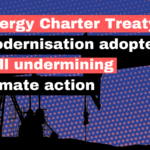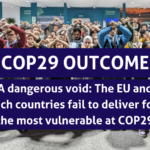- Climate justice win to help people suffering from loss and damage and to make the EU and other big historical polluters pay for the impacts of climate change
- Risk of funds going down the drain if emissions reductions are not addressed to stop causing climate change
- Groundhog day when naming fossil fuels: the main cause of climate change is again weakly addressed in the final texts, missing a meaningful push towards the 1.5 limit and risking climate impacts escalation
- The so-called ‘implementation’ COP fails to deliver new finance for climate adaptation and mitigation from developed countries to developing ones
Sharm-El-Sheikh, 20 November 2022 – The UN Climate Summit in Egypt, gone into overtime with progress only rushed in the very last days and hours, has concluded with the positive agreement to create a fund to address the impacts of climate change bringing justice to developing countries that are particularly vulnerable to climate change. In spite of the poor role of the Egyptian Presidency, and thanks to civil society’s push, countries have managed to agree on a loss and damage fund, a request that dates back to even before the creation of the UNFCCC.
Ahead of and in the early days of the COP, a number of EU Member States including Austria, Belgium, Denmark, France, Germany, Ireland and the European Commission made loss and damage finance pledges. Although most of this money is not new and additional, this signal of support helped build momentum towards the establishment of the fund.
However, many key details remain to be discussed over the next year in the work of the ‘transitional committee’ setting the rules on the loss and damage response fund, to ensure the equity principle is the guiding light, so that the most vulnerable are eligible for these funds, the biggest polluters pay for them, and the funds are sufficiently fed with new and additional grants finance.
“This particularly challenging COP brings one piece of hope, especially for the most vulnerable people, with an agreement to set up a Loss and Damage fund. But very little progress on the long to-do list countries have in order to tackle the biggest challenge of our times – most importantly, phasing out all fossil fuels. The poor role of Egypt’s Presidency and some countries blocking progress in the wee hours should not deviate our attention on other crucial aspects. The EU has to continue to raise its ambition on emissions reductions, support a just transition out of fossil fuels, deliver on climate finance and unravel the details of the new loss and damage fund to help to make it operational as soon as possible. This winning combo is, at this stage, the only way out of the climate crisis and the EU should be taking a leading role.” – Chiara Martinelli, Director at CAN Europe.
Mitigation
Mitigation and loss and damage are inherently intertwined: there won’t be enough money to deal with the devastation that climate change causes and we risk loss and damage funds going down the drain unless Nationally Determined Contributions (NDCs) are drastically enhanced to stop increasing temperatures. The EU, who has played a relevant role in pushing for keeping the 1.5°C limit alive, announced in the COP its readiness to update its NDC from 55% to 57%, however this is far from what’s needed to manage to limit global temperature rise to 1.5 by 2030. CAN Europe asks the EU to reduce emissions by at least 65%, carbon sinks aside, and the COP27 decisions reiterate the call for countries to update their NDCs in line with the 1.5°C limit.
The Mitigation Work Programme adopted at COP27, which will run at least until 2026, is just the bare minimum of what is needed to add additional momentum, so governments should fill this with collective ambition to reduce global emissions at least by 43% this decade.
“We are on groundhog day. While it feels like a victory to protect the 1.5 limit, we cannot spend climate summits reassessing our commitments, countries should rather be making progress to achieve them. The EU and Member States have played a key role in Egypt to keeping the 1.5 alive in COP decisions, now they have to follow by reducing emissions at least by 65% by 2030 to contribute to achieving the Paris Agreement in an equitable manner and stop adding on to the climate crisis.” – Sven Harmeling – International Climate Policy Expert at CAN Europe
Climate Finance
Discussions on climate finance for developing countries to be able to adapt and mitigate climate change have been extremely poor. Going into the COP, developed countries were projected to deliver on the annual US$100 billion climate finance contribution to developing countries only by 2023, when it should be delivered every year from 2020-25. There were few reassurances on scaling-up climate finance at the Summit. Due to the serious shortfall on adaptation finance in particular, last year at COP26 in Glasgow parties agreed to double adaptation finance by 2025 based on 2019 levels.
Despite the calls of African parties and civil society at COP27, this issue failed to get a dedicated agenda item or the political attention it deserved, and will only be considered through a technical progress report by the Standing Committee on Finance rather than a concrete action plan or roadmap. On a more positive note, for the first time a dedicated space was agreed to discuss ‘Article 2.1c’ of the Paris Agreement which calls for shifting all finance flows towards low greenhouse gas emissions and climate-resilient development in the form of the Sharm el-Sheikh dialogue between parties and stakeholders in 2023. These must centre equity and act as a space to make up lost ground on phasing out fossil fuel finance, and getting finance flowing towards energy access, just transition and adaptation, in order to build a firm base for action at COP28.
“The EU played an important role supporting the agreement to set up the loss and damage fund. But that should not distract us from the games played by rich countries on the rest of the finance agenda: finance completely stagnated at this African COP, with very little to no progress on scaling-up financial support for developing countries to adapt to climate change and reduce their emissions. The calls of African parties for progress on adaptation finance did not get enough attention and were relegated to a technical report. The EU played a damaging role on weakening calls for the US$100b to be delivered in full, and hid behind the US and Switzerland’s tricks to delay discussions on the new climate finance goal to replace it” – Rachel Simon – International Climate Finance Policy Expert at CAN Europe
Fossil fuels
Sharm-el-Sheikh did not address the main cause of climate change: the use of fossil fuels. Countries failed to build on Glasgow’s call to phase down coal at COP26, and didn’t go beyond that to a much needed agreement to phase out all fossil fuels. Furthermore, new language including “low emissions” energy alongside renewables as the energy sources of the future presents a significant loophole.
In the energy field, we have witnessed the EU in stark paradox: on the one hand trying to position the bloc as a climate champion while on the other aiming to solve a fossil fueled crisis by signing gas deals – short sighted actions that will only perpetuate it and extend it to vulnerable countries and well beyond the EU. An energy colonialist approach in Africa will result in stranded assets and in locking countries in fossil fuels, hampering their transition from fossil fuels to renewables or even their access to electricity. This EU’s panic shopping for Russian gas replacements has been materialised with new gas or hydrogen contracts with Egypt and Namibia that foresee expanding gas and so-called “hydrogen ready” infrastructure, which is expensive, dangerous and a short-sighted false solution.
Human Rights and Civil Society
CAN Europe is deeply worried about increasing difficulties for NGOs participation in UN Climate Talks in and outside the summit’s venue, hindering the essential observer role we have in pushing for bolder policies and keeping governments accountable in climate negotiations. Throughout the two weeks we united our voices across the globe to say loud and clear that there is no climate justice without human rights. Furthermore, logistical challenges are not frivolous and should not be overlooked: Difficulties to get water, food, affordable accommodation, meeting rooms, sitting spots and plugs are essential for all, including for parties and observers, to be able to do our work.
—ENDS—
Reactions from CAN Europe members
Notes to editor
- COP27 final outcome
- CAN International reaction to COP27’s final outcome
- Other press releases from CAN Europe these days
- Fears of EU backtracking on fossil fuels tomorrow
- Huge Civil Society protest floods the COP to demand biggest Fossil Fuel Polluters to PAY UP NOW for loss and damage
- An empty methane declaration will not help to phase out fossil fuels
- The EU hydrogen rush at COP27 is short sighted and risks extending the energy crisis beyond the EU
- EU’s announcement at COP27 to increase emissions reduction is still far off track to limit temperature rise to 1.5°C
- Turkey’s new climate target does not take the country’s 2053 net-zero goal seriously
- CAN Europe’s COP27 page
Contact:
Nina Tramullas, Communications: nina.tramullas@caneurope.org +34 676 030 140



